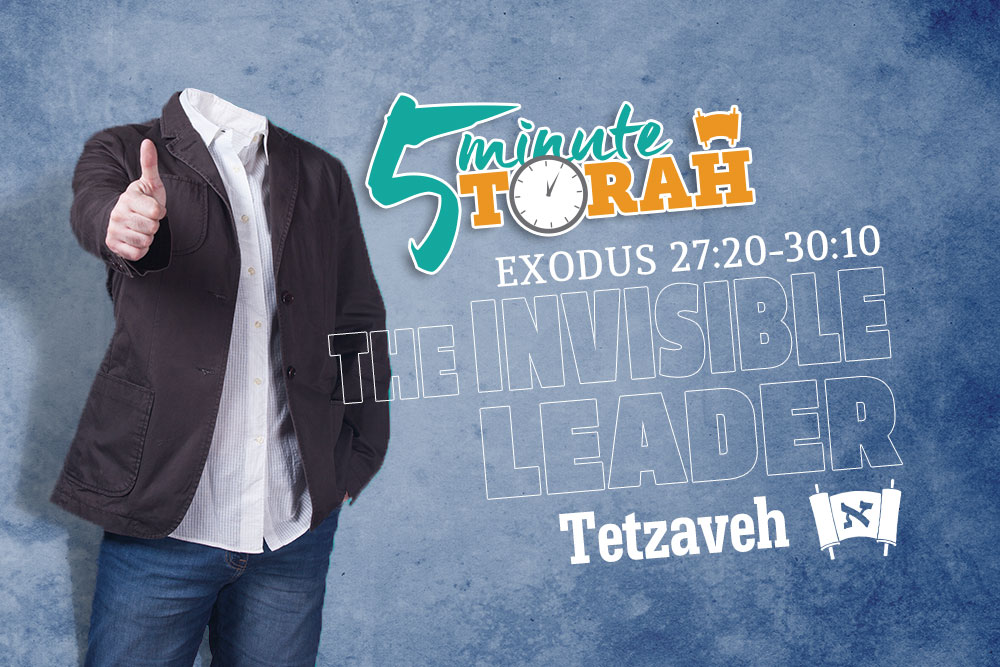The Invisible Leader
Series:

Parashat Tetzaveh (Exodus 27:20-30:10)
Parashat Tetzaveh is unique from all of the other Torah portions from the beginning of Exodus to the end of Numbers in an unusual way. How so? The name of Moses is curiously missing from the text. In every other portion we hear his name mentioned at least once, if not multiple times. This week, however, the Torah is silent when it comes to actually naming Moses. Why is this the case?
There are several theories as to why this Torah portion does not mention the name of Moses. The predominant theory connects this week’s Torah portion to the major event that happens in our next reading, Parashat Ki Tisa. What is this? The sin of the golden calf. While Moses was still up on Mt. Sinai receiving the Torah from Hashem, the Israelites forced Aaron to make an idol they could worship. The LORD revealed to him what was going on in the camp and told Moses that He was going to destroy the entire nation and start over with him:
I have seen this people, and behold, it is a stiff-necked people. Now therefore let me alone, that my wrath may burn hot against them and I may consume them, in order that I may make a great nation of you. (Exodus 32:9–10)
Moses quickly made his way down the mountain to intervene on behalf of the Children of Israel. He pleaded with the LORD to not destroy them. He went so far as saying that if Hashem blotted them out then his name should be blotted out also:
Alas, this people has sinned a great sin. They have made for themselves gods of gold. But now, if you will forgive their sin—but if not, please blot me out of your book that you have written. (Exodus 32:31–32)
Moses stood up for the Children of Israel. He was even willing to give up his own life on their behalf. He told God that if He was unwilling to forgive the Israelites, then He would have to blot him out of His book also. What book does he mean? He means the Book of Life. And because of his chutzpah—his bold tenacity—and his fierce devotion to his brothers and sisters, he was able to turn the LORD’s anger away from the Children of Israel. And because the LORD forgave Israel’s sins He did not blot out Moses from the Book of Life. But he did remove his name from one of the Torah portions as a reminder for us of Moses’ caliber of leadership—the portion of Tetzaveh that is primarily focused on equipping the priests to serve as a mediator between God and Israel.
The Apostle Paul follows the example of Moses by saying that he would even be willing to cut himself off from Yeshua for the sake of his Jewish brethren:
I have great sorrow and unceasing anguish in my heart. For I could wish that I myself were accursed and cut off from Christ for the sake of my brothers, my kinsmen according to the flesh. (Romans 9:2–3)
Yeshua, the prophet who was to be like Moses (Deuteronomy 18), also followed Moses’ example and was willing to lay down his life on our behalf in order to draw us near to his Father. He “emptied himself, by taking the form of a servant, being born in the likeness of men. And being found in human form, he humbled himself by becoming obedient to the point of death, even death on a cross” (Philippians 2:7–8). Paul tells us that Yeshua “emptied himself.” In a sense, both he and Moses became invisible. They were willing to forego their own desires for the sake of others.
Most people aren’t able to let go of themselves and truly focus on others. A true leader, however, is a servant and a shepherd. He is willing to lay down his life on behalf of his flock. His actions should not be focused inwardly but on those whom he is leading. Yeshua told his disciples, “For even the Son of Man came not to be served but to serve, and to give his life as a ransom for many” (Mark 10:45). Both Moses and Yeshua exhibited this trait by being willing to lay down their lives for the flock of Israel. A true leader is willing to do the same. Learn from the Good Shepherd and lay down your life—at least your priorities—for those you are serving. Be that invisible leader that everyone wants to follow.








